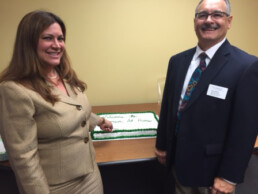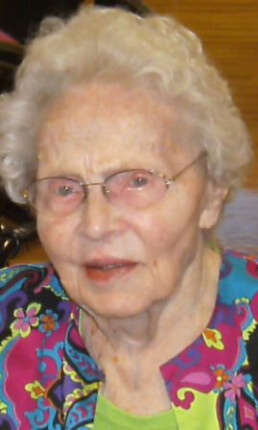Dementia-Friendly Communities Emerging in Midwest
 Around Minnesota and Wisconsin, you will be seeing more businesses posting a new window cling with a purple angel symbol and this message: “We are a Dementia Friendly Business.”
Around Minnesota and Wisconsin, you will be seeing more businesses posting a new window cling with a purple angel symbol and this message: “We are a Dementia Friendly Business.”
The Life-and-Death Experience of Ecumen Board Member Kris Linner
 The Rev. Kris Linner, an Ecumen board member, has been working in hospice the past 15 years,helping people die with dignity. In the process, she has learned a lot about living.
The Rev. Kris Linner, an Ecumen board member, has been working in hospice the past 15 years,helping people die with dignity. In the process, she has learned a lot about living.
Celebrate National Rural Health Day Today
 Ecumen honors doctors, caregivers, farmers, business owners, families and community leaders as they celebrate National Rural Health Day today.
Ecumen honors doctors, caregivers, farmers, business owners, families and community leaders as they celebrate National Rural Health Day today.
Ecumen New Richland Chef Troy Thompson Gets Rave Reviews
The folks at Ecumen New Richland are raving about Chef Troy Thompson. His food is “delicious above all conception,” said one resident.
Ecumen Lakeshore Knitting Group Helps Women’s Shelter in Duluth
The Ecumen Lakeshore Knitting Group in Duluth is using its talents to help support the Safe Haven Shelter in a joint project with the Duluth Woman’s Club.
A story in the Duluth Budgeteer News tells how the knitters are using yarn provided by the Woman’s Club to create a variety of handmade gifts such as caps, scarves, mufflers and slippers.
The shelter offers safety for women who are battered and their children, and works to end violence against women.
Ecumen Home Care – Twin Cities Inaugurates New Office Space
Ecumen Home Care - Twin Cities held an open house Nov. 17, 2014, to show off its expanded new offices at 199 Coon Rapids Boulevard, Suite 111, in Coon Rapids, Minn.
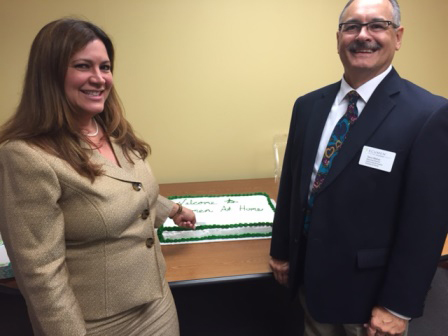 PICTURED AT RIGHT, Frances Fernandez, Director of Ecumen Home Care -Twin Cities, and Terry Mahar, Ecumen Regional Director of Home Care and Hospice, welcome open house guests with cake and refreshments.
PICTURED AT RIGHT, Frances Fernandez, Director of Ecumen Home Care -Twin Cities, and Terry Mahar, Ecumen Regional Director of Home Care and Hospice, welcome open house guests with cake and refreshments.
Ecumen Home Care - Twin Cities is a Medicare-certified home health agency that provides medical and non-medical home care services for the Minneapolis-St. Paul metro area to help older adults live independently longer in their homes.
Medical home health care is prescribed skilled care provided by a licensed medical professional. Non-medical care assists with daily activities and functions, such as homemaking, personal care and social wellness.
In addition to the Twin Cities area, Ecumen Home Care is a licensed provider serving older Minnesota residents in the Duluth, Litchfield and Mankato.
Ecumen Awarded LeadingAge Innovation Grant To Test Dementia Care Light Therapy
Ecumen has been awarded a $29,800 LeadingAge Innovations Fund grant to integrate light therapy into memory care units for adults with Alzheimer’s disease and related dementias (ADRD).
An estimated 80 to 100 people with ADRD living in Ecumen memory care units will be part of the pilot program using light therapy as a way of decreasing sleep disturbances and reducing depression and agitation. In its grant proposal, which was chosen from 110 applications, Ecumen cited promising research showing exposure to bright lights and blue lights can increase daytime wakefulness and improve night sleeping among people with ADRD, who can spend 40 percent of their nights awake and a large portion of their days asleep. 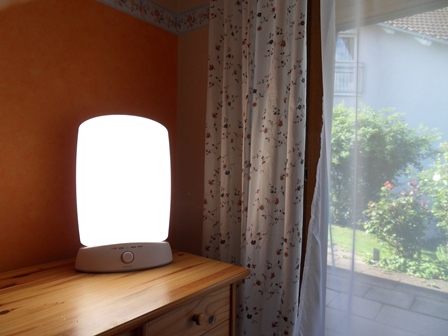
The pilot will be at three sites— Ecumen Parmly LifePointes in Chisago City, Minn., and Ecumen-managed sites Grand Village in Grand Rapids, Minn., and Heritage Living Center in Park Rapids, Minn. Training and development work on the initiative will begin in January, 2015, and the light therapy is expected to begin by April, 2015. At the three sites, blue lights will be installed in common areas and bright light tablets will be placed in residents’ rooms. In its grant application, Ecumen said: “Based upon our review of the literature, we believe two to four hours of exposure to bright or blue lights should be effective in improving sleep patterns and reducing agitation.”
The light therapy project will be incorporated into the ongoing Ecumen Awakenings™ initiative, a care program that emphasizes managing dementia without highly sedating drugs. Residents, their families, doctors and care staff all work together to replace traditional drug therapies with individualized techniques that reduce anxiety and difficult behaviors while improving quality of life. Behavioral changes already are carefully monitored and documented, and measurement of the effects of the light therapy will be incorporated into the ongoing programs.
LeadingAge, a national association of nonprofit aging services providers, awards Innovations Fund grants to nonprofit providers of aging services for projects that “have a demonstrable impact on residents, clients, families, employees or the broader community, and that have the potential for replication.”
The grant to Ecumen falls in the category of Innovative Dementia Care Programs “that pursue promising strategies for improving the quality of life and quality of care for people with dementia.” The awards are funded from LeadingAge’s Great Minds Gala (held in partnership with Integrace, formerly EMA), as well as the generosity of LeadingAge members and individuals. Earlier this year, Ecumen received national recognition as winner of the LeadingAge Excellence in Dementia Care Award recognizing extraordinary leadership in the quest to improve lives of those touched by Alzheimer’s disease and other dementias.
Top 5 Most-Read Articles - November 17
In case you missed out, here are the articles Ecumen's online visitors found most interesting last week:
Ecumen Employees: Sandy Lia's Career of Caring at Ecumen Detroit Lakes
In her 36 years at Ecumen Detroit Lakes, Sandy Lia has been an activity director, a volunteer coordinator, the founder and manager of the adult day services program, a housing manager and currently the fund development coordinator with additional duties in marketing and event planning. ...
Army Veteran Wanda Nordlie, a Resident of Ecumen Litchfield, Cared for Prisoners Liberated from Nazi Concentration Camp
Ecumen of Litchfield resident Wanda Nordlie, 91, was an Army nurse in World War II who helped care for thousands of ill and malnourished prisoners liberated from a Nazi concentration camp in Ebensee, Austria. “It was a long time ago, but you never forget stuff like that,” she says. ...
How to Become a Professional Caregiver: 5 Steps to Turn Your Passion and Skills Into a New Career as a Professional Caregiver
Gertrude Hii Beimers decided she wanted to be a professional caregiver during years of caring for her husband, who died a few years ago of Lou Gehrig's disease. So she got her certified nursing assistant (CNA) degree and started work for Catalina In-Home Services in Tucson, Arizona, providing home care. "Like a lot of other direct care workers," she said, "I found my way to my career through caring for a member of my own family." Her story is not unusual these days, with these two trends conflating at rapid speed: people living longer and requiring help with chronic illnesses, and boomers like Beimers wanting to make a living doing something meaningful. By Dave Singleton, Caring.com Author; Courtesy of Caring.com.
Policy and a Pint - How Will We Take Care of Mom?
As baby boomers reach retirement and beyond, younger generations need to think about the kinds of care their aging parents will likely need. At the Citizens League and 89.3 The Current's next Policy and a Pint® program - “How will we take care of Mom?” - they will look at how changing demographics are shaping the way we think about aging in the 21st century. ...
Ecumen Century Club: Happy 101st Birthday Eldora Clark
Eldora turned 101 on November 12. ...
You can read these articles and learn more about Ecumen at ecumen.org.
Ecumen Century Club: Happy 100th Birthday Thelma Whitton
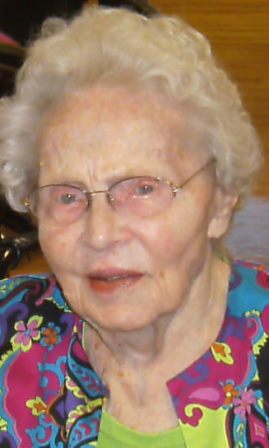 Ecumen honors Thelma Whitton, a resident of Ecumen Parmly LifePointes in Chisago City, Minn., who is 100.
Ecumen honors Thelma Whitton, a resident of Ecumen Parmly LifePointes in Chisago City, Minn., who is 100.
Star Tribune's Anderson: More in Minnesota Keep Hunting Into Their Golden Years
 The number of elder Minnesotans who are still active soars in 10 years. In hunting, is 80 the new 60?
The number of elder Minnesotans who are still active soars in 10 years. In hunting, is 80 the new 60?



